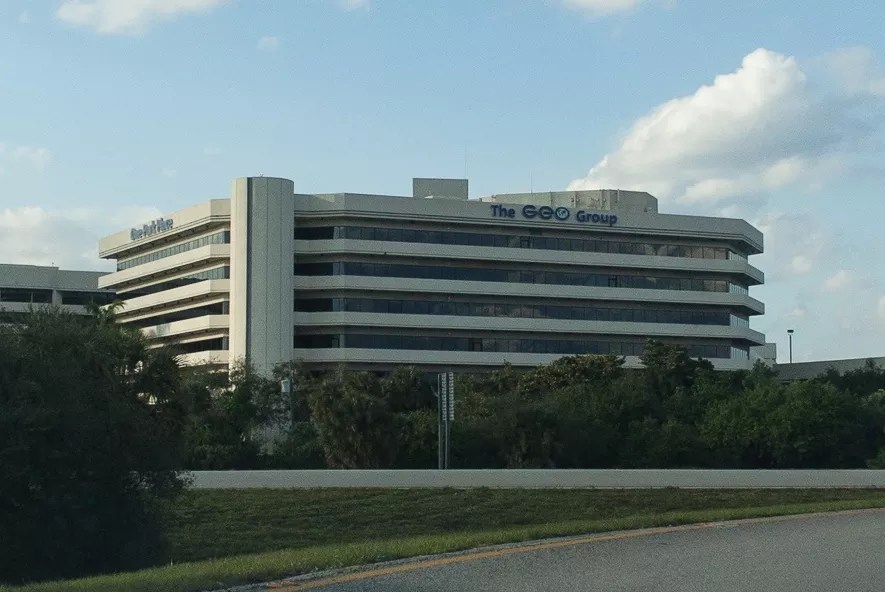
Eflatmajor7th / Wikimedia Commons

Audio By Carbonatix
America largely phased out the use of privately run, for-profit jails and prison facilities in the early 20th Century after the public realized the practice of making a profit from caging people was a particularly heinous piece of the capitalist economy. But amid a government privatization push under Ronald Reagan, the idea came back. Two private-prison firms – Tennesee’s CoreCivic and Florida’s GEO Group – dominate the for-profit human-caging business today.
Now a new report from the nonprofit Sentencing Project lays out just how quickly private, for-profit firms have come to control the U.S. prison system: According to a report the project released yesterday, between 2000 and 2016, Florida’s number of privately incarcerated inmates jumped from 3,912 in 2000 to 12,176 in 2016 – a spike of 211 percent.
“As outlined in the state case studies examining the history of prison privatization in Florida, New Mexico, New York, North Carolina, and Texas, those corrections systems most committed to the industry have faced controversy, including riots, deaths, and allegations of improper financial influence from for-profit prison companies,” the Sentencing Project notes.
In terms of percentage increase, Arizona technically led all states, jumping 479.4 percent, from 1,430 to 8,285 inmates. In terms of total population, Texas topped the list with more than 13,000 private inmates, but its population declined by 2.1 percent from 2000 to 2016.
In terms of pure numbers, though, no state added more private inmates during that period than Florida. The state does operate America’s third-largest state prison system, after all, which includes eight privately run prisons. GEO Group, based in Boca Raton and formerly known as Wackenhut, runs five of the compounds.
The report notes that, though the private-prison industry claims it can carry out jailing services at cheaper, more efficient rates than publicly funded prisons, data hasn’t backed up those claims. The Sentencing Project called state-level cost savings “
In a Florida-specific case study, the Sentencing Project noted that the Sunshine State became the second in the nation after Texas to begin using private-incarceration facilities. State officials at the time said the private companies had promised to improve “rehabilitation services” and recidivism rates statewide. But those benefits never materialized.
“State officials stated that free-market incentives would significantly fix the inefficiencies in the adult correctional system,” the report reads. “However, by 2003, a study by Florida State University concluded that Florida’s recidivism rates for private and public prison facilities were similar.”
The state also set up a “Corrections Privatization Committee” in 1993 which, in true Florida fashion, engaged in so many brazen acts of corruption that the state had to shut the panel down. The nonprofit writes:
The Committee subsequently engaged in a series of ethics violations. In 2002, Mark Hodges, director of the Committee, was fined $10,000 by the Florida Commission on Ethics for earning $150,000 from his holdings in prison consulting contracts in other states Ken Kopczynski, a policing analysist in Florida, notes that Hodges owned thousands of shares in Core Civic. In 2006, another former director of the Committee, Alan Duffee, pled guilty to embezzling $200,000 from a private prisons maintenance fund.46 These violations by officials in the Corrections Privatization Committee led to the office being shut down by the state legislature in 2006.
New Times has reported extensively on GEO’s activities in Florida over the past few years, from running multiple Immigration and Customs Enforcement detention centers to being sued for alleged forced labor to pumping money throughout the Florida legal system. Earlier this summer, the political-donation-tracking news outlet MapLight uncovered that GEO had funneled money into Rick Scott’s 2018 Senate campaign – despite the fact that federal contractors are banned from making political donations. After a struggle, activists successfully persuaded the Florida Democratic Party to ban all donations from private prison companies.
“Moreover, at least one prison company appears to be acting in the personal financial interest of President Trump,” the Sentencing Project writes. “GEO Group changed the location of its annual meeting from a resort in Boca Raton, Florida, to the Trump National Doral Golf Club in Miami. This club is reported to be the single biggest contributor to Trump’s cash flow.”